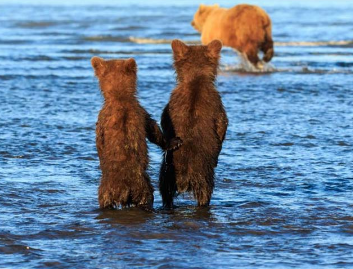(单词翻译:单击)
Lewis Kemper from California took an amazing photograph of two bear cubs watching their mother hunt in Lake Clark National Park in Alaska.
来自加利福尼亚州的路易斯·肯珀在阿拉斯加州克拉克湖国家公园拍下了一张两只小熊看着熊妈妈捕猎的让人称奇的照片。
The picture shows the two cubs stood side-by-side as the smaller one paws at the bigger sibling's back while they stare intently at their mother, who was hunting for salmon.
照片中,这两只小熊肩并肩站着,小点的那只将爪子搭在大点的兄弟/姐妹的背上,它们都目不转睛地注视正在捕鲑鱼的熊妈妈。

"The two bears held hands for around 20 seconds, hoping their mother would bring them some dinner but unfortunately, she came back fishless," said Kemper.
肯珀称:"这两只小熊手拉手大约20秒,期待它们的妈妈能给它们带回一些晚餐,但不幸的是,熊妈妈空手而归。"
"Although bears love their fish, most of them are omnivores and mainly eat plants and of course, a lot of grass."
"虽然熊类都喜爱鱼,但是其中大多数都是杂食动物,主要吃植物,当然也吃很多的草。"
"Bears are usually very calm, which makes them great animals to photograph."
"熊类通常都很安静,这使得它们得以成为最适合拍摄的动物。"
Lake Clark is known as Qizjeh Vena by the First Nations Athabascan people, which means 'place where people gather lake'.
克拉克湖因原住民阿萨巴斯卡人所说的"Qizjeh Vena"而为人所知,该词的意思是"人类收集湖水的地方。"


